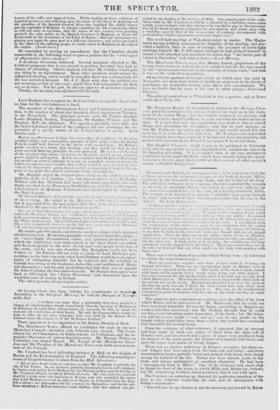Sir George Clerk has been visiting his constituents at Stamfbad.
According to the &nutting Mercuq, he told the Marquis of Exetar's serfs, that
" as there was more than a probability that there would be a change of administration almost immediately after the meeting of Parliament in February, it would front circumstances be necessary for him to vacate his B
seat and A. a reelection at their hands. He said the Conservatives would re- turn to office on the saint. principles that were held by Sir Robert Peel's Cabinet before the coming in of the Melbourne Cabinet."
There appears to be no opposition to Sir Rufane Donkin at Deal.
The Manchester Tories offered no candidates for seats in the new Municipal Council ; therefore only Liberals were elected. The Coun- eihnen are 10 Churchmen, 12 Independents, 14 Unitarians, and the re- mainder Dissenters of various denominations. Mr. Thomas Potter, an Unitarian. was elected Mayor. Mr. Taylor of the Manchester Guar- dian and Mr. Prentice of the Manchester Times were both elected mem- bers of the Council.
Mr. Urquhart has been delivering lectures at Hull on the designs of Russia and the Eastern policy of England. The following amusing ac- count of his performance is taken from the Hull Advertiser-
" All we have hearth tends to convince us that Mr. Urquhart is covertly the ally of the Tories. In one instance, probably deeming he was in safe company, lie began condemning Lord Durham thr his Russian policy, and fOr having, as Mr. Lrquhart alleged, sacrificed British interests. lie was, however, soon cut short by a plain man, who had been in Russia, and who reminded the orator that Lord Durhatn received an address of thanks at Cronstault from the Eng- lish residents ant shipmasters for his courtesy to themselves, and for his - form attention t o British interests:—and further, that this address was pre- sented by the brother of Mr. Corky. of Hull. One amusing part of the exhi- bition made by Mr. Urquhart is, that he is attended by a barrister, whose name nobody seems to know, but who, whenever he can firm a gap in the conversa- tion of his friend or patron, insinuates his own opinion, and prates away with a volubility equal to that of the ex-secretary of embassy, accompanied with gesticulations which a pantomime performer might envy.'
The torch-light meeting at Wakefield ended in smoke. The Magis- trates having publicly announced the illegality of the meeting, and pro- vided a military force in case of outrage, the inventor of torch-light meetings himself, Mr. F. O'Connor, (though he had pledged himself to attend,) both preached and practised the lesson that " the better pan of valour is discretion," and staid at home.—Leeds Mercury.
The Manchester emerir says, that Messrs. Jowett, proprietors of the factory burnt down at Ashton. are now satisfied that the fire was caused by the " spontaneous combustb at of a quantity of cotton waste," and that it was nut the work of an incendiary.
Of the 70,000 quarters of foreign wheat on which duty was paid in Newcastle, not more than 10,000 or 12,000 are at present in the hands of merchants, the remainder having gone direct into consumption. We have no doubt that the same is the case in other places.—Gateshead Observer.
The price of good wheat at Wakefield is 86.s. a quarter, and at New- castle-upon-Tyne, S4s.


























 Previous page
Previous page